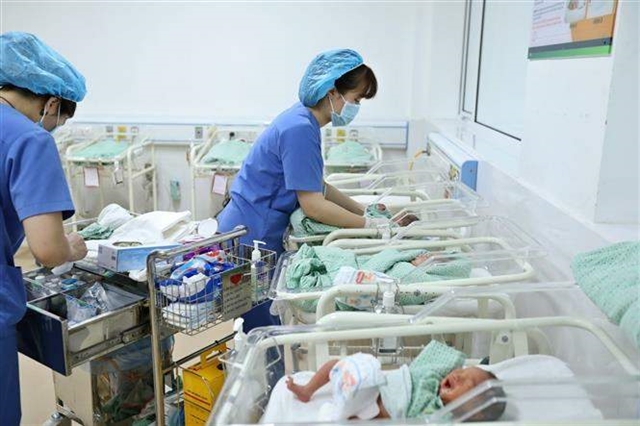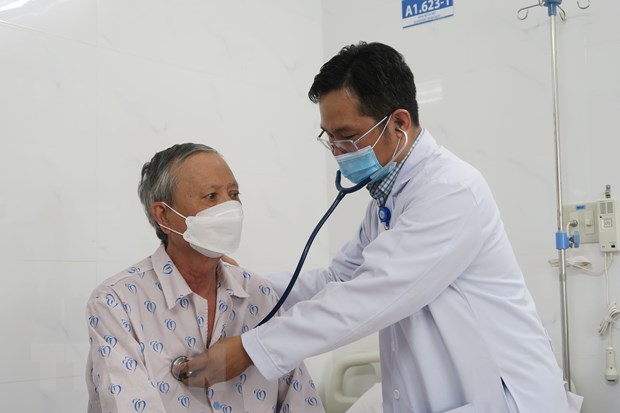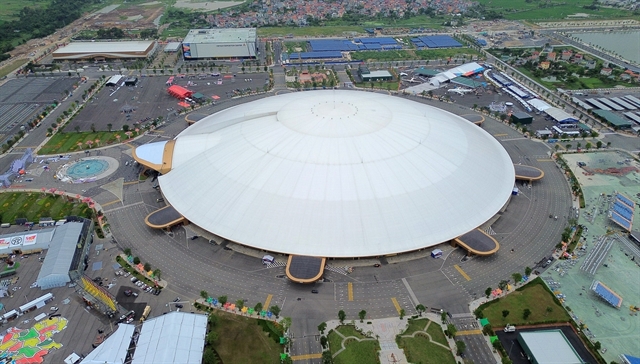 Society
Society

HCM CITY — A low birth rate and an ageing population two major challenges facing HCM City, which may cause significant impacts to its socioeconomic development for the southern metropolis in the future.
As of this year, the elderly population accounts for 11 per cent of the total population, officially pushing the city into its ageing phase. Along with that, the city’s birth rate has continuously declined over the past decade. Encouraging childbirth and improving the quality of life for the elderly are essential to address the city’s problems.
Increasing birth rate
Statistics from the HCM City’s Department of Population and Family Planning showed that the city’s fertility rate is 1.39 children per woman of reproductive age, steadily decreasing from the rate of 1.76 in 2000.
This has made the HCM City one of 21 provinces and cities with the lowest fertility rate in the country.
The number of young women choosing to have only one child, not get married or not give birth is increasing over the last decade. The economic burden is considered to be the key reason for the decline.

|
| HCMC strives to handle the low birth rate. — VNA/VNS Photo Minh Quyết |
Lê Thu Hà, a 35-year-old woman, has decided not to have a second child despite her daughter being 11 years old.
Hà said: “My husband and I come from the countryside. After moving to the city, we are factory workers so our income is low.
“Over the past two years, my husband’s company has been facing difficulties so there has been a slowdown in his work, which makes our financial situation even tighter.
“We still haven’t been able to buy a house so we don't think about expanding our family.”
Many women decide to have only one child because they want to advance their careers or worry about the hardships of raising children.
Despite not facing financial pressure due to her husband working for a big company, Trần Như Quỳnh, 30, also decided to have only one child. However, the demand to develop careers and the need to ensure a fulfilling life for their child has contributed to their decision.
Quỳnh said: “My husband and I are both very busy at work so raising a child is not easy for us.
“If we have a child and leave all the responsibilities to the nanny, I don’t think we should have another child.
“Having a child means we have to ensure a sufficient life for the child both materially and emotionally,” Quỳnh added.
The survey from the Department shows young women tend to get married later. Along with that, young people also have to face more pressures of housing, employment and living expenses. Meanwhile, the cost of raising a child including food, housing, clothing or education has increased significantly. Those lead to a decrease in the birth rate.
Phạm Chánh Trung, head of the HCM City’s Department of Population and Family Planning, believes that the low fertility rate will pose the risk of a future labour shortage in the city.
Trung said: “The low birth rate will have a significant impact on the population structure, as the proportion of the young people decreases while the proportion of elderly increases. This will accelerate the ageing process of the city’s population.”
The HCM City People’s Committee issued a programme on population policies to 2030 in March 2023, aiming to address the decline in the birth rates.
According to the programme, the city has set targets to increase the fertility rate to 1.4 children per woman by 2025 and 1.6 by 2030. However, achieving this goal is not an easy task.
Dr Nguyễn Hữu Hưng, deputy director of HCM City’s Department of Health, expressed concerns that the goal will be challenging without appropriate policies to encourage couples to have children.
The Population and Family Planning Department has proposed to the city several solutions to increase the birth rate including provide financial support.
Trung said: “The solutions that the Department has suggested are exempting and reducing hospital expenses for the second childbirth, supporting loans to purchase social housing or to rent a house for those who have already given birth to two children. Those benefits are applicable to couples with household registration in the city.”
Ensuring welfare of elderly
The latest statistics from the Population and Family Planning Department indicate that the proportion of people aged 60 and above in the city has been increasing in recent years. In just three years, from 2019 to 2022, the elderly population rose from 9.3 per cent to 11.03 per cent, now representing more than one million people.
The average life expectancy of the city’s residents is also on the rise, reaching 76.3 years in 2022, while the national average was only 73.6 years.
Despite living longer, many of them face difficulties in life such as lack of income, reliance on their children for support and health problems.
At the age of 69, Trần Văn Phùng, living in District 3, does repairs for motorbikes on Võ Văn Tần Street to make a living.
Phùng said: “I can earn around VNĐ100,000 (US$ 4.20) in a day. My wife is now 65 and still works as a part-time maid with the same income as mine.
“Our income is barely enough to cover our daily expenses. We still need to rely on our children and grandchildren.”
Some elderly people are luckier than Phùng as they have a monthly pension. However, many of them suffer from chronic diseases which means their pension is mostly spent on regular medical check-ups and medication.

|
| An elderly person having a routine check-up at Thống Nhất Hospital, HCM City. — VNA/VNS Photo Đinh Hằng |
Trung said: “The ageing population not only poses the risk of a labour shortage in the future but also increases the pressure on healthcare systems and pension provisions.
“Specialised healthcare systems for the elderly are not yet fully developed. The current social welfare policies provide assistance which only meets the basic needs of the elderly.”
Lê Đình Thanh, director of Thống Nhất Hospital, said: “The city is in its ageing phase. The number of elderly increased but not many of them are in a good state.
“On average, an elderly person is affected by two or three chronic diseases, such as high blood pressure or diabetes, which require regular care and treatment.
“HCM City should establish a centre to provide comprehensive care and treatment for the elderly, thereby improving their quality of life.”
Dr Huỳnh Thành Lập, the representative of the city’s Elderly Association, believes that there is a need to change social perceptions and attitudes towards ageing and the elderly.
Lập said: “The elderly should not be seen as recipients of social welfare or a burden to society, but as active contributors to the community.
The city should consider a comprehensive strategy to ensure income for the elderly, including social welfare benefits and pensions.
“Creating employment opportunities and skill development for the elderly is also crucial to ensure their income and well-being, especially for those without pensions or with low pensions,” Lập added.
“The authorities should set up model elderly care facilities and gradually expand such facilities. Encouraging private sector participation could lead to more care homes for the elderly in the future.” — VNS




